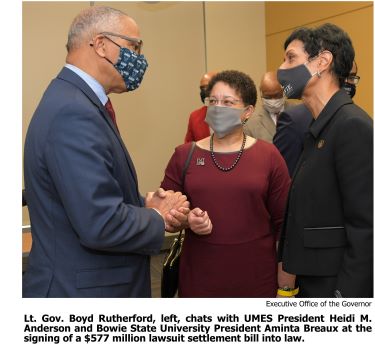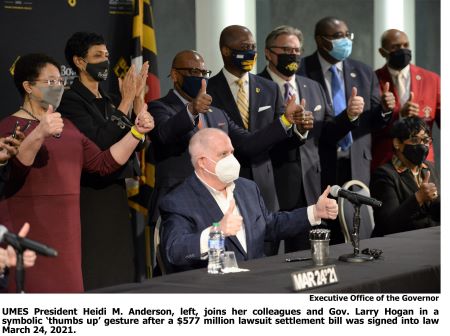
Gov. Larry Hogan signs into law a $577 million pledge to Maryland’s HBCUs
Wednesday, March 24, 2021
In what President Heidi M. Anderson called “a defining moment in the history of the University of Maryland Eastern Shore,” Gov. Larry Hogan signed a law today to resolve a 15-year federal lawsuit that challenged the fundamental history of how the state supports its public institutions of higher education.
The new law pledges $577 million in supplemental funding to Maryland’s four historically black institutions – UMES, Bowie State, Coppin State and Morgan State – over a 10-year period beginning July 1, 2022. UMES’ estimated annual allocation is $9.6 million.
The money is state government’s answer to what plaintiffs claimed was an inequitable policy of financial support for its public colleges dating back decades. Lawsuit proponents pointed to the duplication of degree programs – especially in the Baltimore area, where schools like Morgan and Coppin compete for students with the University of Maryland Baltimore County and Towson University.
A federal judge eventually sided with alumni and friends of Maryland’s HBCUs who signed on as plaintiffs and directed the state to work out a resolution instead of putting a specific amount on what the legislature and governor had to come up with to resolve the case.
The same $577 million settlement was included in a 2020 legislative package just as the COVID19 pandemic began casting a dark cloud over the economy. Hogan vetoed the measure, citing worries that making such a long-term commitment could be catastrophic for Maryland’s economy.

At Wednesday’s ceremony on the Bowie State campus, Hogan said the outlook is brighter and “We’re here today to enact an historic, bipartisan measure that will be an unprecedented step forward in addressing inequities in our higher education system by making substantial investments in Maryland’s historically black colleges and universities.”
Hogan said his administration, over the past seven years, had shown a willingness to address complaints about funding inequities.
The governor noted his administration has supported funding HBCUs “at historically high levels,” including $1 billion for major projects, including a new $90 million pharmacy and health professions building now under construction on the east side of the UMES campus.
“This legislation that we’re signing into law,” Hogan said, “will provide even more critical investments for all of these institutions. It brings to an end a more than 15 year long legal battle that we inherited and spent years working hard to resolve in a fair and equitable manner.”
Anderson and her advisers are still sorting through ideas on how the supplemental funding will be spent over the next 10-plus years, guided by wording in the law that stipulates it must be used for academic purposes, support for faculty and marketing the institutions to boost enrollment.
“It’s a defining day for us, and for the citizens of the state,” Anderson said after the bill signing. “We are going to be able to bring new programming that will help the citizens – things like healthcare disparities and food insecurity. And we will remember this day forever.”
Anderson joined her state HBCU counterparts in Bowie to witness the signing, and came home with a ceremonial pen from the governor commemorating what she told an interviewer was a “momentous moment.”
In a message that went out to campus, Anderson said “I want all of us to express our deepest gratitude to the many people and groups who have brought us to this moment.” She praised pioneers who signed on to the lawsuit and legal team that took on the challenge of successfully arguing the case.
“The unrelenting efforts, tenacity and persistence of all of these individuals — and many others — have brought us to this historic moment,” Anderson wrote in her message to the university community.
Her boss, University System of Maryland Chancellor Jay Perman, also weighed in.
“It’s a critical component in strengthening affordable access to an HBCU education; creating dynamic, high-quality degree programs that attract the best and brightest students; and keeping the institutions competitive in Maryland’s rich higher education landscape,” Perman said.
“The legislature’s overwhelming support for this bill and the governor’s signing of it affirm our leaders’ commitment to Maryland’s historically Black institutions,” he said. “The USM applauds this move to ensure funding equity for the state’s HBCUs and thereby secure their future.”
Hogan, a Republican, said the state’s financial offer to resolve the lawsuit demonstrates that “together I believe we are sending a very important message – that we can work in a bipartisan way and deliver real results.
“Together, we are ensuring that any student in Maryland who wishes to pursue a degree will have access to world class programs and the highest quality institutions for many years to come,” the governor said.
Much work still needs to be done, Anderson noted in her campus message.
“Our task is to ‘pick up the baton’ … and continue to move forward ensuring these funds will sustain our universities for the future providing scholarships to deserving students and helping us to launch new, in-demand programs to attract new students.”

